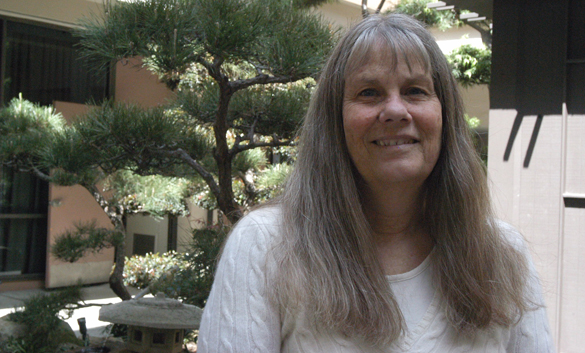When on vacation in Mexico as 20-year-old college drop-out, Dr. Janine Gasco came to a realization that eventually evolved into her life’s work. Upon viewing ancient pyramids and ancient Mesoamerican sites, particularly the ruins of Teotihuacan near Mexico City, she realized that she had found an answer to the question of where to focus her studies.
“I just remember being floored, so completely impressed and curious,” recalls the associate professor of anthropology and this year’s winner of the Excellence in Research, Scholarship and Creative Activity Award. “I thought, ‘How terrible is it that I don’t know anything about what’s going on in the country next door? That’s what I’m going to study.’”

Gasco subsequently returned to college at the University of California, Santa Barbara, and since then, her research has encompassed archaeology, ethnography, history, and everything in between. And, she regularly takes students at California State University, Dominguez Hills along for the ride, with opportunities such as learning first-hand about the cacao industry in Chiapas, Mexico, by working side-by-side with local growers and non-governmental organizations that work to modernize farming practices and enable fair trade for the local product.
“You can read all you want, or watch films about how other peoples’ lives are,” Gasco points out, “but until you experience it one-on-one, and talk to them, visit their homes, and see day-to-day activities, it’s a completely different level of understanding what another culture is like.”
Gasco says that she and her colleagues strive to teach students how to parlay the critical thinking and data-gathering skills they learn as anthropology majors into job skills relevant to today’s market, whether they become anthropologists or not. Graduates of the anthropology program have taken many diverse career paths beyond academia, including cultural resource management, serving as a language and cultural interpreter, and creating ethnographical studies in order to help businesses operate better within the global workplace.
“We spend a lot of time helping them think of how students can use their training,” she says. “They’re trained observers, they’re writers, and they’ve been exposed to a lot of technology. When you open up the [classifieds], you’re not likely to see an ad looking for an anthropologist. You have to be creative to figure out what can turn you into a good marketer, public relations person, or anything dealing with analytical skills and working with the public.”
Gasco earned her bachelor’s, master’s and doctoral degrees in anthropology from UC Santa Barbara, where she began her teaching career as a lecturer. She began her career at CSU Dominguez Hills in 1993 as a lecturer and joined the faculty permanently in 1998. She has also taught at the University of Minnesota, CSU San Bernardino, the University of California, Irvine, CSU Los Angeles, and Occidental College. From 1990 to 1993, she served as the director of research for the Institute of Mesoamerican Studies at the State University of New York at Albany and has also been a research associate at the Natural History Museum of Los Angeles since 2002.
Gasco has written numerous articles and chapters, including “Le da alegría tener flores’: Homegardens in the Soconusco Region of Chiapas, Mexico” for the Journal of Ethnobiology,” “Soconusco Cacao Farmers Past and Present,” a chapter for “In The Origins of Chocolate: Cacao in the Americas,” (Cameron McNeil ed.); and “The Consequences of Spanish Colonial Rule for the Indigenous Peoples of Chiapas” for the book, “The Transformation from Postclassic to Colonial Periods in Mesoamerica” by Rani Alexander and Susan Kepecs.
Gasco has a forthcoming publication titled, “Prehistoric Settlement on the South Pacific Coast of Chiapas, Mexico,” which she co-authored with Barbara Voorhies and Paul Cackler; the book will be released this year. Her other books include “The Legacy of Mesoamerica: History and Culture of a Native American Civilization,” (2nd ed.) which she co-edited with Robert M. Carmack and Gary H. Gossen and “Approaches to Historical Archaeology in Middle and South America,” co-edited with Greg Smith and Patricia Fournier-García.
An expert on indigenous agriculture in rural Mexico, Gasco has done archival research at Archivo Histórico de Chiapas and Archivo Diocesano de San Cristobal, focusing on the environmental history of Soconusco. She is a member of the American Anthropological Association, the Society of Ethnobiology, the Society for Applied Anthropology, and the American Society for Ethnohistory.
Gasco says that what she has most enjoyed over the years has been introducing CSU Dominguez Hills students to a simpler way of life in rural Mexico.
“Even for students who may have been to their grandparents’ farms in Mexico, going to a completely different place where they don’t know anybody and are viewed as an American, is really eye-opening,” she says “Some of the most touching comments from students are about how they realize that you don’t have to be rich to be happy and that you can live in really rustic conditions and still laugh. It touches them on a deep level to know that maybe the way we do things here isn’t the only way.”